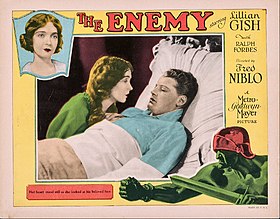The heartbeat of the world
| Movie | |
|---|---|
| German title | The heartbeat of the world |
| Original title | The enemy |
| Country of production | United States |
| original language | English |
| Publishing year | 1927 |
| length | 90 minutes |
| Rod | |
| Director | Fred Niblo |
| script |
Willis Goldbeck Agnes Christine Johnston |
| production | Fred Niblo |
| camera | Oliver T. Marsh |
| cut | Margaret Booth |
| occupation | |
| |
The Heartbeat of the World is a 1927 American anti-war silent film directed by Fred Niblo with Lillian Gish in the lead role. The film is based on a play (1925) by Channing Pollock .
action
The story takes place in Austria-Hungary at the end of the imperial era, immediately before the outbreak of the First World War . Carl Behrend and Pauli Arndt have only been married for a short time. He is the son of a businessman, she the daughter of a university professor. When the war begins, Carl is called to arms and sent to the front. Now his old friendship with the Englishman Bruce Gordon is also at stake.
All war euphoria quickly evaporated, the belief in a quick and easy victory must give way to hunger, misery and destruction at home and at the front. Pauli and her child are doing particularly badly, their pacifist father, who verbally speaks out against the war, is fired because of his convictions. Pauli's husband Carl is missing at the front. Eventually Pauli's child dies of malnutrition and exhaustion, but in the end a glimmer of hope sprouts: Carl has escaped the mass deaths at the front and returns to his loving wife.
Production notes
The heartbeat of the world had its world premiere on December 8, 1927. The film was shown in Germany and Austria at the end of the following year.
The film structures were created by Cedric Gibbons and Richard Day . The Heartbeat of the World , shot after The Wind but released in theaters before this film, was Gish's last silent film.
criticism
“It is a film that cannot be ranked among many similar anti-war films. (...) The unfortunate war of annihilation, which at the moment turned sensible people into enthusiastic blind dreamers and then only created unhappy, disappointed deceived people. (…) The director Fred Niblos has understood how to make often-watched war scenes gripping and so lively that they provide a powerful framework for the simple and yet so poignant plot. (...) Lilian Gish, in her touching inwardness, is very finely selected for precisely this role, which easily leads to exaggeration. "
Web links
- The heartbeat of the world in the Internet Movie Database (English)
- The heartbeat of the world. In: Österreichische Film-Zeitung , December 8, 1928, p. 14 (online at ANNO ).
